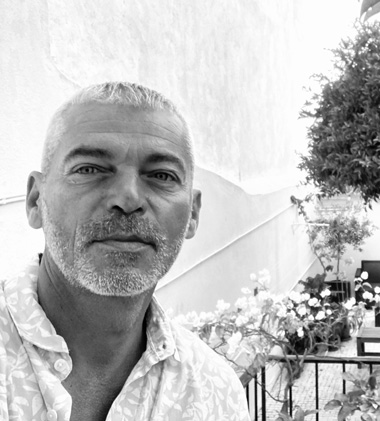A Cinematographic Dreamland
Serra do Açor, in the Heights of Portugal
Exclusive Agent
Pascal Chesnot | Real Estate
(+351) 964 841 529
http://pascalchesnot.com
IG: pascallisboa
Get In touch

"After more than a decade in music marketing in Paris and New York, I moved to Lisbon in 2005 to pursue a new dream and a new life. Five years later, I opened “Le Petit Bistro”, a French restaurant in Bica, which I sold in 2015. Since then, I have focused on curating rare properties and distinctive real estate projects across Lisbon, Alentejo, and Central Portugal."
Silence—in the Eco Village curling along the range of mountains where Serra do Açor and Serra da Lousã interlace—has depth, spirituality, and texture.
Surrounded by nature’s wealth and majestic topography, its scenery is highly poetic. Flair lights at dawn, and the golden hours at dusk stretch across the mountain ridges, illuminating the facades with atmosphere.
A cinematographic dreamland on the mountain crests, sheltered near the highest-altitude point of mainland Portugal, Serra da Estrela (“Star Mountain”), the landscape instantly sparks the mind and unleashes imagination.
Living off-grid is a fantasy for many, but only a few truly dare the experience. It is both a responsibility towards millenary-old nature and the thrilling blessing of mastering something radically cool.
The eco village is one of five distinctive schist villages in the protected landscape of Serra do Açor —the fifth-highest mountain in the country. Schist villages (Aldeias do Xisto) appeared between the 12th and 18th centuries, primarily in Central Portugal.
These villages are part of a larger network of 27 schist villages in the region. Today, these cultural and historical gems have become magnets for rural tourism, eco-retreats, and heritage sites.
Proof of the attraction: Japanese architect Kengo Kuma—renowned for his work on the Calouste Gulbenkian Foundation’s Center for Modern Art in Lisbon—is restoring three abandoned villages in the Lousã mountains. Kuma believes that widespread adoption of this lifestyle could “change the way we think about society” and “become an alternative model of work in the near future.”
The social movement leaving urban spaces for untouched nature is unstoppable. At its core, sustainability drives this acceleration.
Schist construction is now seen as sustainable, climate-responsive architecture. The material’s thermal mass and natural beauty continue to influence modern eco-building in Portugal.
On hillsides or ridges, often with limited access to markets or roads, the schist villages are clustered near streams, forests, and terraced fields. Self-sufficiency is essential, and this philosophy of resilience and adaptation, speaks to generations now leaving cities for experimental journeys in wilderness.
In this womb of nature, the Eco Village is a rehabilitated ensemble where ancient stones meet modern design. Comfort and sustainability, with deep respect for the original architecture and lifestyle, anchor the concept.
The space draws mystic energy from the mountains and its guardians—olive trees, chestnut, and eucalyptus trees coloring the land with a spectrum of green hues.
Around the property, five waterfalls provide pure, fresh water, which quickly becomes a daily ritual. Collecting drinkable water—an ancestral practice shared across cultures—feels deeply instinctive for new arrivals.
Enter the Eco Village and feel embraced by a nurturing environment. The heartbeat slows to match the nonchalant rhythms of the surroundings. Breezes evoke motherly tenderness, and the cluster of homes in rich nature seems to hold ancestral secrets and healing powers.
While built and natural environments form a symbiotic whole, expect fully operational amenities: plenty of hot water, solar power, high-speed internet, recyclable water and compost systems, a permaculture garden, a chicken and two ducks, a natural well to greet dawn, an outdoor pool and indoor sauna, a professional kitchen serving homemade kombucha, and, for breakfast, the vegan “Nutella”—a must.
The Village offers a pristine environment for sound meditation, sound recording, yoga, well-being practices, music events, permaculture workshops, and more. The calendar for 2025 is already full, with event bookings until the year’s end.
If well-being has become one of the most prolific business avenues in the last decade, it was pioneered long ago in Pondicherry, India, by one of the Eco Village’s founders.
Let’s call the card Dimitri.
Dimitri was born in France in the late ‘60s. He made a name in ‘90s Paris with FKGB—a creative studio revolutionizing music and movie marketing. The concept took off, still resonating among those who worked in Parisian counterculture, indie print magazines.
Unmoved, Dimitri moved from Paris to Auroville, India, in 2000, answering a spiritual call. He soon launched The Dune, a beach resort near Pondicherry. For those wondering how a graphic designer could transition to hospitality, credit his mother—an interior designer—and both parents, antique art collectors. He grew up surrounded by refined furniture and culture.
Restoration became Dimitri's hallmark in India: an old Tanjore townhouse became a resort, he restored the Madras Club in Chennai and the French High School of Pondicherry.
Asked about his contribution to hospitality and travel as a lifestyle, he said, "What I have done is a drop in the ocean, but we brought a different model of hotel to South India in terms of heritage preservation and sustainability. Wherever we go, we will preserve and highlight local culture and local values.” The Dune Eco Village and Spa opened in 2005 with 62 cottages, transforming a green space purchased in 2002.
In Portugal, Dimitri and his associates shaped the site into a bold, self-sustained center that predated the mainstream return to nature—a trend accelerated by social shifts.
Remote work and healthier lifestyles motivate creatives and entrepreneurs to seek new geographies. The rise of the tech-tethered digital nomad, supported by emerging economies and mild climates, is teased by surfing, glamping design, and diverse housing—tiny homes, flat shares, and co-living. Nature-based living moved from niche to necessity after the pandemic, shifting from the margins to the heart of how we live, work, and travel.
If the pursuit of cleaner air, quieter landscapes, outdoor exercise, and slower living has driven urban-to-rural migration, eco-projects and nature retreats that nourish body and mind and foster digital balance, require new thinking in real estate.
The sharing economy has evolved into a softer, more intentional model—where housing, resources, and purpose are often co-experienced. And releasing from digital hyper-engagement has become one of the most prescient collective desires cutting through cultures and generations. This year found people in digital detox at a retreat in Sri Lanka, Portugal, or a Latin American hideaway. When loneliness is stigmatized, solitude and simplicity become modern virtues.
A solitary swim in a natural well; arms reaching after months hunched over a laptop; drying off by an empty pool, head clear enough for a philosophical essay. While “Eco Village” risks being co-opted by developers, Loural Eco Village has undeniable substance.
Perhaps the magic is timing. Tender and tense, this place reveals the lost paradise we all seek. From indie Paris to Auroville’s universal unity to Portugal’s epic mountains, Dimitri’s journey was never linear, but his prescience for what people need is clear in his legacy. The space pulses with life stories and heritage—genuine and deeply felt.
This place of rebirth within nature, respectfully untamed, is where the smartphone returns to its role as simple tool, free from addiction.
Outposts lost in nature give space for new and old knowledge to unfold, beyond preconceptions, quick answers, endless scrolling, and mental stagnation. Perhaps the philosophy of universal unity floats like pollen among these magical mountains. And soon, new villages everywhere will bloom as experimental “satellites”— untethered from the mothership.
Come visit. Stay in the Sun Room with its door to dawn or retreat to the angled Moon Room. Join sound therapy and permaculture courses, and new realms of empirical knowledge, enjoy the place as it is today. Climb the magic mountains and experience the site. Fertile soil for wildflowers, dead trees as totemic sculptures, and a van for road-trip dreamers, all idle in this high place.
There’s something in the river’s flow, the waterfall’s joy, the Rio de Mouros, and even in the tension between pure and filtered water—water, the primal element, always present, like the sonic meditation of Philip Glass’s Songs from Liquid Days. And even Rio —the fluffy dog hopping on three legs, ever joyful and ready for endless affection—means river.
The village blurs the line between ancient and modern, East and West, urban aesthetic and wild nature. It’s both template and sketchbook. The echo from its hilltop will resonate among true entrepreneurs and visionaries. Even the unfinished architecture seems intentional, an open circle awaiting inspired souls to spark new ripples.
Its edict is clear—it calls for genuine encounters. Somewhere, there is someone as bold, determined, musically gifted for ambitious partitions; someone fearless, fond of off-grid landscapes that stir toward celestial imagination…

